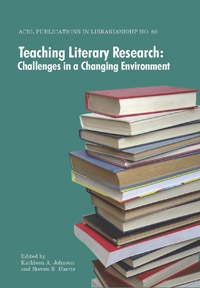
Primary tabs
You don't need to be an ALA Member to purchase from the ALA Store, but you'll be asked to create an online account/profile during the checkout to proceed. This Web Account is for both Members and non-Members. Note that your ALA Member discount will be applied at the final step of the checkout process.
If you are Tax-Exempt, please verify that your account is currently set up as exempt before placing your order, as our new fulfillment center will need current documentation. Learn how to verify here.
- Description
- Table of Contents
- About the authors
Teaching Literary Research: Challenges in a Changing Environment is a collection of essays that explores the relationship between information literacy and literary research. English professors and librarians provide perspectives on this relationship through presentations of best practices in teaching students from first year undergraduate through graduate levels.
Their work focuses on the significance of information literacy to the teaching of research methods in literary studies. This volume meets the need for an expanded exploration of best practices in teaching literary research to students at various levels, undergraduate through graduate, and in various areas of literary focus. "The book" continues to be of utmost importance to the disciplines of language and literary study, but networks, databases, and digital works all have an impact on the research process of the literary scholar. This collection of essays confronts these challenges and presents effective practices as experienced from both the teaching faculty and librarian points of view.
Teaching Literary Research is #60 in the ACRL Publications in Librarianship monographic series, an occasional series focusing on research projects of interest to the academic library community. For more information on how to publish a PIL book contact the ACRL PIL Editor, Craig Gibson at jgibson1@gmu.edu
Introduction
Teaching Literary Research
Kathleen A. Johnson and Steven R. Harris
Part One: Students, Literature, and Information Literacy
Chapter 1: Information Literacy as Situated Literacy
Van E. Hillard
Chapter 2: "I Couldn't Find an Article That Answered My Question": Teaching the Construction of Meaning in Undergraduate Literary Research
John C. Bean and Nalini Iyer
Chapter 3: Literary Eavesdropping and the Socially Graceful Critic
Kate Koppelman
Chapter 4: The Printing Press and the Web: Modernists Teaching Postmodernists
Elizabeth M. Williams
Part Two: Literary Situations
Chapter 5: Researching Southwestern Literature: Challenges and Strategies
Kate Manuel
Chapter 6: Literary Research in a Bilingual Environment: Information Literacy as a Language-Learning Tool
Miriam Laskin and José Díaz
Chapter 7: Ways of Knowing: Integrating Folklore Studies, Composition and Information Literacy through a Learning Community
Vickery Lebbin and Kristin McAndrews
Chapter 8: The Changing Nature of the Book: Literary Research, Cultural Studies, and the Digital Age
Austin Booth and Laura Taddeo
Part Three: Literary Librarians
Chapter 9: Through the Eyes of Picasso: Literary Research from the Best of Both Worlds
Meg Meiman
Chapter 10: Libraries, Librarians, and the Resources of Literary Study
William A. Wortman
Chapter 11: Librarians Influencing the (Literature) Core Curriculum
Sheril J. Hook and Verónica Reyes-Escudero
Chapter 12: Training Librarians for Teaching Literary Research Methods
Helene C. Williams
Chapter 13: Work in Progress: An Assessment of the Literature of Literary Research Instruction, 1978-2003
Daniel Coffey
Chapter 14: Work in Progress: An Assessment of the Literature of Literary Research Instruction, 2002-2008
Kathleen A. Johnson
Appendix:
Research Competency Guidelines for Literatures in English, June 2007
Contributors
Index
Kathleen A. Johnson
Kathleen A. Johnson is Professor of Libraries, University of Nebraska-Lincoln (NE).
Steven R. Harris
Steven R. Harris is Director of Collections and Acquisitions Services, University of New Mexico Libraries (NM).


